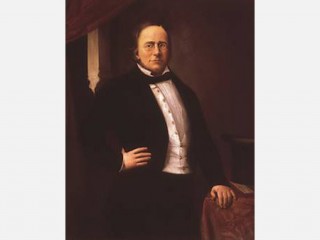
Daniele Manin biography
Date of birth : 1804-05-13
Date of death : 1857-09-22
Birthplace : Venice, Italy
Nationality : Italian
Category : Politics
Last modified : 2011-02-17
Credited as : Statesman, and patriot,
The Venetian patriot Daniele Manin labored for the liberation of Venice from Austria and made an important contribution to the unification of Italy.
Daniele Manin was born on May 13, 1804, the son of a converted Jew who adopted the name of the patrician family that had sponsored him. Manin studied law at the University of Padua and then took up practice in Venice. As his practice grew, his reputation as a brilliant and profound jurist grew with it.
Manin's first act in the cause of liberation was the presentation of a petition in 1847 to a body called the Venetian Congregation, a purely advisory assembly that the Austrian government permitted to gather precisely because it had no power at all. The petition, addressed to the Emperor, listed the grievances of the Venetian people. Manin hated the Austrian domination of Venice and was injudiciously frank about it.
On Jan. 18, 1848, he was arrested for treason. His arrest served only to increase his popularity. Within 2 months the revolution had broken out, and the Venetians forced the Austrian governor to release him on March 17. Nine days later the Austrians were driven from the city, and Manin guided the erection of a provisional government and became president of the short-lived Venetian Republic.
Manin cooperated, albeit reluctantly, with the efforts of the Piedmontese government to unite Italy under its own auspices. When this effort failed, and the king of Piedmont, Charles Albert, signed an armistice leaving Venetia under Austria, there was a wild scene in Venice leading to an attempt to lynch the Piedmontese representatives. Manin intervened and, through the great prestige he enjoyed, saved their lives.
Venice managed to retain its independence from Austria for almost another year. After the support of the Piedmont ended, the Austrians began gradually to reoccupy all the Venetian mainland. Hope was fading, but early in 1849 the Venetian Assembly reaffirmed Manin as president of the republic and gave him unlimited authority. They voted to resist to the end.
Austrian forces surrounded the city and began to bombard it from land and sea. Under siege conditions the supply of food dwindled, and in July cholera spread throughout the city. Defeat was inevitable, and on Aug. 24, 1849, Manin capitulated under the best terms possible: amnesty for all except himself and some other prominent citizens who had helped him.
On August 27 Manin left for Paris, where he came to believe that the only hope for Italian unity lay with the Piedmontese monarchy. He cooperated in the founding of the Societe Nazionale Italiana, an organization devoted to the goal of unification under the Piedmont. On Sept. 22, 1857, Manin died, only a few years before Italy realized the goals he had spent his life to achieve.
















